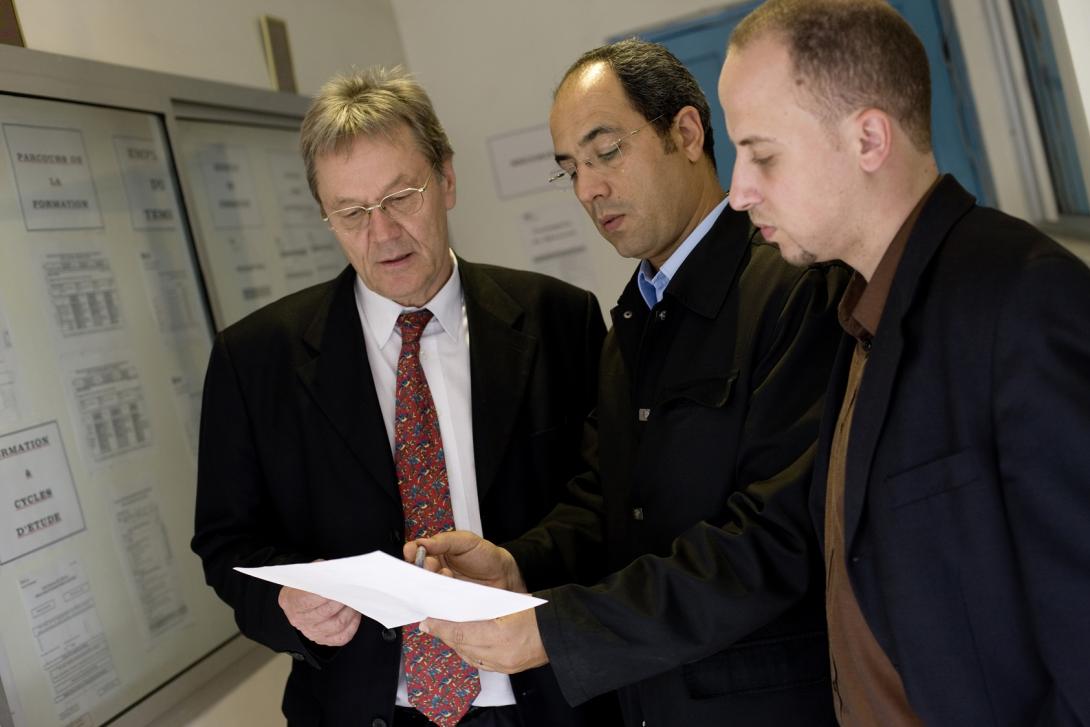Resource Efficiency Training for Policy Makers PNERI- Programme National D'Efficacité des Ressources de l'Industrie au Maroc

© GIZ, Marokko
This formation is part of the process of elaborating a National Resource Efficiency Action Plan or Program (REAP) in the industry led by the Ministère Délégué Chargé de l'Environnement (MdE). GIZ also accompanies this process as part of its pilot action in the project Rioplus – Environmental politics and sustainable development.
There is no single definition for a REAP, which is built differently according to the needs and choices of the country in question. For this reason, it is crucial that the programme is developed so that all concerned actors are integrated. The proposed process for the elaboration of a REAP is inspired in the approach developed by UNEP for the elaboration of national programmes for sustainable production and consumption.
Main features and components
The programme of the present formation mobilises public and private actors, as well as civil society through a participative approach. The objective of the formation consists in providing technical and strategic support in all relevant aspects for the elaboration of a REAP, namely:
- The technical and strategic concepts and instruments for increasing resource efficiency (RE) in the industry
- The working methods for the definition, in a participatory way, of common objectives and strategies
- Best Available Techniques and Best Environmental Practices within the context of exemplary industries and sectors
- Knowledge of approaches for the elaboration of a national resource efficiency programme in diverse sectors and countries (experience elsewhere)
- Reinforced capacities for discussing and elaborating a resource efficiency national programme in Morocco (working methods for the definition of objectives and strategies as well as their implementation in the medium term).
Implementation and work steps
The formation consists of six modules :
- Module 1: Introduction
- Module 2: Example of Best Environmental Practices (BEP) and of Best Available Techniques (BAT) for two industrial branches: dye and fishmeal
- Module 3: Definition of networks and their organisation
- Module 4: Base for the elaboration of a National Plan
- Module 5: Establish the strategy of a National Programme (based on failings in branch and network)
- Module 6: Restitution and closing
The participatory aspect has priority all along the formation in order to guarantee an exchange in profundity and to facilitate constructive reflection. Discussion of the four main questions which arise in elaborating a REAP is especially encouraged. Namely:
- Why initiate a REAP?
- What situation do we want to achieve?
- What instruments are available?
- How can the good development of the programme be ensured?
Output
After having treated the four main questions all along the training through presentations, plenary discussions, and interactive exercises with case studies in working groups, the participants of the 3 days training will have achieved the following objectives:
- They have understood the definitions, concepts, instruments and approaches for the elaboration of a national resource efficiency action programme.
- They can apply this expertise in their countries or institutions.
- They can apply this expertise within their own spheres of influence drawing on their personal action plans in order to be able to play an important role in incentivising a strategic process and in elaborating a national resource efficiency action programme for Morocco (working methods for the definition of objectives and strategies as well as their implementation in the medium term).
Downloads
Characteristics
Phase of intervention
Operating SIA, Resource efficiency
Level of intervention
Policy level (central), Policy level (decentral)
Regions
MENA
Countries
Morocco
Target groups
Policy makers